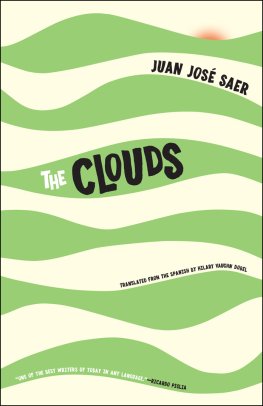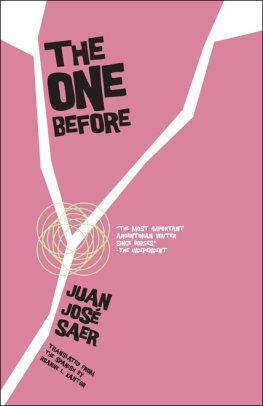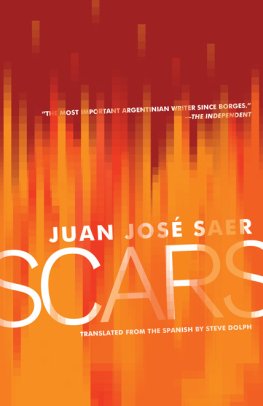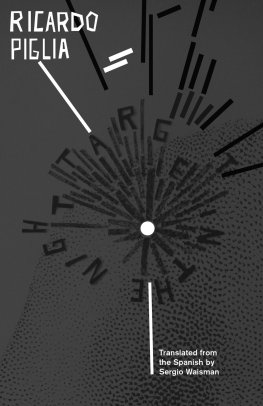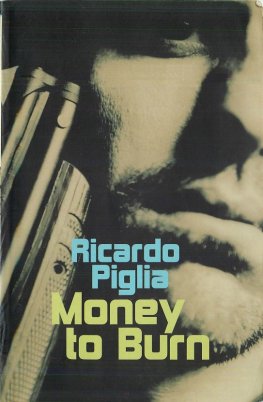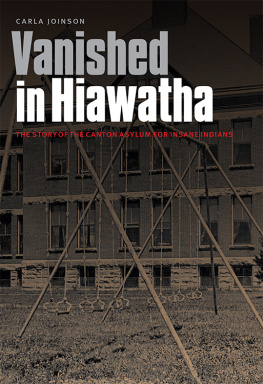Afford thy desire some time.
La Celestina, Act VI
He finds himself already at the corner by the ice cream stand, shielded from the sun by the broad red-and-white-striped awning. Before moving out of the shade to the sunny sidewalk across the street, he anticipates the feeling of heat-softened asphalt beneath the soles of his brown loafers. And now, on the gray sidewalk that shimmers and burns in the summer siesta hour, his shadow pools at his feet as if shriveled by the sun as it finally begins to sink, slowly, from its high point.
He is about to eat a double-scoop of chocolate and vanilla, his unusual lunch, and if hes waited this long to leave his office to buy it its nearly two-thirty it is because hes decided that the ice cream ought to get him by until dinnertime. Doubtless, the heat is the primary cause of such frugality, but a sort of athletic stoicism, as he imagines it (a result of the days caprice rather than habit), colors this stratagem of his ever so slightly with virtue. So he is pleased for the moment: content, spry, and healthy, and, not yet too far into his fifties, he believes he has great prospects, both immediate and long-term. He feels tall, bright, and vital, as if a red carpet stretched from the tips of his toes on to infinity. But almost immediately the harsh summer weather, the tumult of the street, and the black, noxious exhaust fumes carry him back to reality, to that midpoint in his soul between anxiety and euphoria that acquaintances and he himself, grown convinced by what began as an idle joke refer to with unjustified certainty as his temperament.
The heat wave has broiled the city for over a week. From a cloudless blue sky, the sun beats down with a merciless, all-pervading light that scorches the trees, muddies the senses, and dulls the mind. The heat relents only at night, and, then, only a little, but during Daylight Savings Timestrictly an administrative decision, he likes to joke, only until the hens change their mindsat the years height, nightfall never ends and dusk lingers until just after 3 A.M.; when everyones still sleepless on account of the heat, dawn breaks, livid, in the east, and the intolerable sun reappears. Crowds of people lie tanning on the riverbanks, waiting for night, rain, vacation, an unlikely breeze, but the sweaty workers who eye them from the docks or one of the bridges, from the bus or the elevated metro over the Seine, watch the crowds with skepticism rather than jealousy.
It is the sixth of July. Last year, intending to settle affairs with his few remaining friends, Pichn visited his native city for some weeks from mid-February through the beginning of April after a twenty-year absence. Despite the years, the let-downs, and the strangeness of it all, he returned to Paris with a handful of good memories and a promise from Tomatis to come visit, but a whole year has passed waiting for Tomatis to make travel plans. Certain Sundays, they would speak on the telephone though they never had anything particular to say. As they lived in different hemispheres, high summer for one meant the other had fists of frozen rain beating at his window. And because of the time difference morning in the city is evening in Paris, and evening in the city is nighttime in Paris the weather occupied much of their conversation. Until one Sunday in May, less than two months ago, they spoke about the weather a little longer than usual because, despite the difference in season, country, continent, and hemisphere, climatic conditions were identical (a cold, rainy day), and Tomatis announced the good news at last: in early July he would spend several days in Paris.
But that wasnt all. Tomatis went on to say that Marcelo Soldithat bearded lad, theyd spent a day taking his fathers dinghy out with the boys to visit Washingtons daughter, did he remember? meant to send him something hed been preparing over the last few months, and Tomatis, without further explanation, let drop an enigmatic phrase to pique Pichns interest: He went to search for Troy and nearly tumbled into Hades. But it must have been in earnest since, perhaps a month later, the parcel arrived: a very long letter and a floppy disk in a medium-sized, self-sticking bubble envelope, which Soldi had further sealed up with clear adhesive tape as a precautionary measure. Soldi had masculinized the word disquette and given it an accent grave, which, as written, appeared as el dsket. In a passage from the letter, he said: Beyond conversations with Tomatis, who can occasionally tax my patience, Ive been amusing myself with impromptu jaunts out to the countryside and poking my nose into old papers that, often miraculously, preserve the memories of this place or of some other place, if one happens to live elsewhere. Whats valid for one place is valid for all space, and we know that if the whole contains a part, the part, in its way, contains the whole.
And elsewhere in the letter: I have a certain advantage over the archives other aficionados: I get along with the elderly. The text Ive sent you in the dsket was entrusted to me by a woman in her nineties who, I believe, never actually read it. Lucky for her, she died, the poor thing, while I was deciphering and transcribing it with the utmost fidelity into a clean copy, so now I wont have to be evasive or lie to her about the contents of these papers; as their owner has no heirs, I have deposited them in the Provincial Archive where they can be consulted now that Ive finished the copies. We are terribly interested in your opinion because, contrary to what I think, Tomatis asserts that the document is not an authentic historical text but a work of fiction. But I say and Ive thought about this carefully what else are the Annals, Lavoisiers Elements of Chemistry, the Napoleonic Code, the crowds and cities, suns and universe, but fiction? And, at the end: The manuscript the old woman gave me was untitled, but if I understood certain passages correctly, I believe the author would not have found it unsuitable if we called it THE CLOUDS.
The envelope arrives in June, the twenty-first, to be exact, at summers door.
As Pichn is still finishing out the year at the university, between reunions, exams, and colloquia, hes had no time to investigate the contents of the mysterious dsket, by now covered in dust, abandoned somewhere among the books, notepads, and papers on his desk. On July second, his wife and boys leave for the seaside, and he has remained in Paris, delayed by a couple appointments, and because Tomatis has announced hell arrive in Madrid at seven that night. The two men have decided to spend two or three days together in Paris where they will be able to speak more freely, and plan to travel together afterward, meeting up with Babette and the children in Brittany.
That morning, around 9:30, Pichn attends a faculty meeting and remains in his office afterward, working until 2:30, when he goes out for ice cream, then heads home for a siesta. Many city-dwellers have already left and, as the tourists (for some reason) have yet to arrive, perhaps preferring the ocean or the mountains in the excessive heat, the city is deserted; because of his familys trip, so too is Pichns flat, hereby establishing a curious parallel between home and city. As the windows are always open to capture stray currents of air, there exists between the city and house a sort of continuity; for a moment, he cant tell which contains the other. There is a silence, older and grander than usual, and it expands with the coming of hot, sticky night after the interminable day. Pichn leans out the second-story window in his shorts with all the lights off, surveying the quiet, empty street, and smoking cigarette after cigarette, taking in the night as through a stethoscope not so much the external details as the sensations those details arouse within him, taking him back to the past, to his childhood most of all, to moments so bright and intense that time seems to stop; to the point where hes forced to consider that many sensations hes always believed unique to a place in fact belong to summer.

